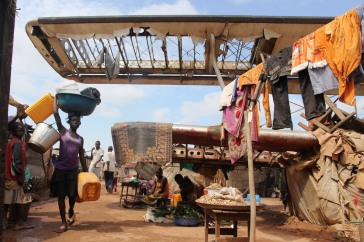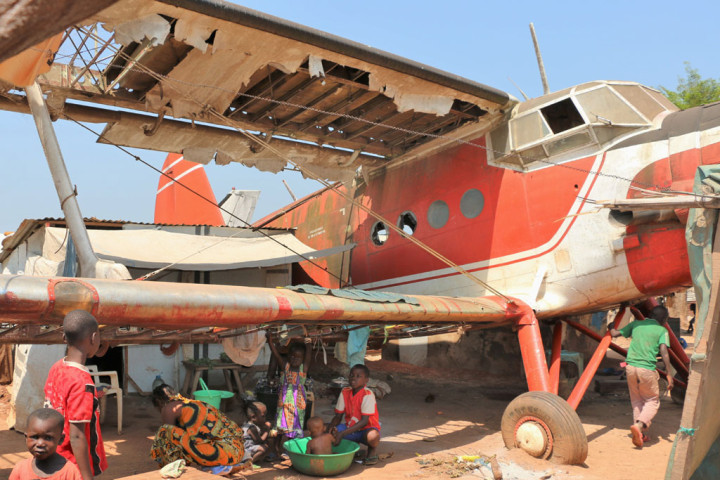10 February 2016 – As the Central African Republic (CAR) prepares for the second round of presidential elections this weekend, a new UN report detailing violations and human rights abuses in the strife-torn nation’s capital late last year has prompted the head of the UN peacekeeping mission there to call for urgent measures in the fight against impunity and to prevent future violations.
The report, which will be released later this month, details grave human rights abuses committed following the eruption of violence in the capital city of Bangui, from 26 September to 20 October 2015.
The period was marked by the targeting and killing of civilians, and widespread looting and burning of houses and property, among other human rights violations.
Peaceful and legitimate elections will mark a major step towards reconciliation, justice and sustainable peace in CAR.
In a statement released this morning, the Special Representative of the Secretary-General and head of the UN Mission in the CAR (MINUSCA), Parfait Onanga-Anyanga, called on CAR authorities, armed groups and the international community to “support the electoral process, to reject all forms of violence, and to respect the results of the polls.”
“Peaceful and legitimate elections will mark a major step towards reconciliation, justice and sustainable peace in CAR,” he added.
Expressing concern “that the perpetrators of grave violations of human rights will enjoy impunity,” he reiterated the UN’s commitment to improving the administration of justice in the country.

Displaced Central African Republic families in Mpoko site for internally displaced persons, October 2014. Photo: OCHA/Gemma Cortes.
Report’s Findings
In compiling the report, MINUSCA investigators documented multiple human rights violations, including at least 41 civilians killed and at least 17 injured; instances of rape and other forms of sexual violence; kidnapping and unlawful detention; and the pillaging, looting and destruction of property. The report quotes extracts from the testimony of witnesses and victims.
The Mission also observed and documented the widespread and systematic looting and destruction of property, including the burning of many houses and theft of humanitarian resources, such as medical equipment, from intergovernmental and non-governmental organizations.
The mission notes that the actual number of casualties and violations is likely to be “far higher” than that detailed in the report, because in the aftermath of the crisis, investigations were constrained by ongoing insecurity and restrictions on movement, particularly in the predominantly Muslim areas of Bangui.
While the majority of violations and abuses were committed by the anti-Balaka and ex-Séléka armed groups and their affiliates, the report also details human rights violations committed by members of the CAR armed forces.
The weakness of State authorities in Bangui, and their widespread absence outside the capital, means there is a serious risk that those responsible for human rights violations will enjoy impunity, the report concludes. The violence in Bangui also set off a series of violent incidents throughout the CAR, including in Bambari, Kaga-Bandoro, Bouar, Carnot and Sibut.
Recommendations
The report’s recommendations include ending impunity and prosecuting those responsible for past and present serious human rights violations and abuses; the end of attacks on civilians by armed groups; and the reform of the CAR armed forces.
In addition, the report calls for the implementation of robust and effective programmes of disarmament, demobilization and reintegration and community violence reduction; protection and assistance to victims of sexual and gender-based violence; and increased financial and technical support from the international community for the establishment and functioning of the Special Criminal Court for CAR.
The first round of presidential elections was held on 30 December 2015, although no candidate received more than 50 per cent of the vote. An interim government has been in place since 2014, with the second round of elections postponed several times due to inter-communal violence.
This past December, the Prosecutor of the International Criminal Court (ICC), Fatou Bensouda, said that her Office would record any instance of violence in the CAR and that anyone committing atrocity crimes would be held accountable.
More than three years of civil war and sectarian violence have displaced thousands of people in the CAR amid continuing clashes between the mainly Muslim Séléka rebel coalition and anti-Balaka militia, which are mostly Christian. The UN recently reported an upsurge in violence, in particular last September and October, committed by armed elements.
The mission plans to share the findings of its investigations with the ICC and the Special Criminal Court for CAR, which will be established in the near future. (Source: UN).
2016 Human Wrongs Watch










